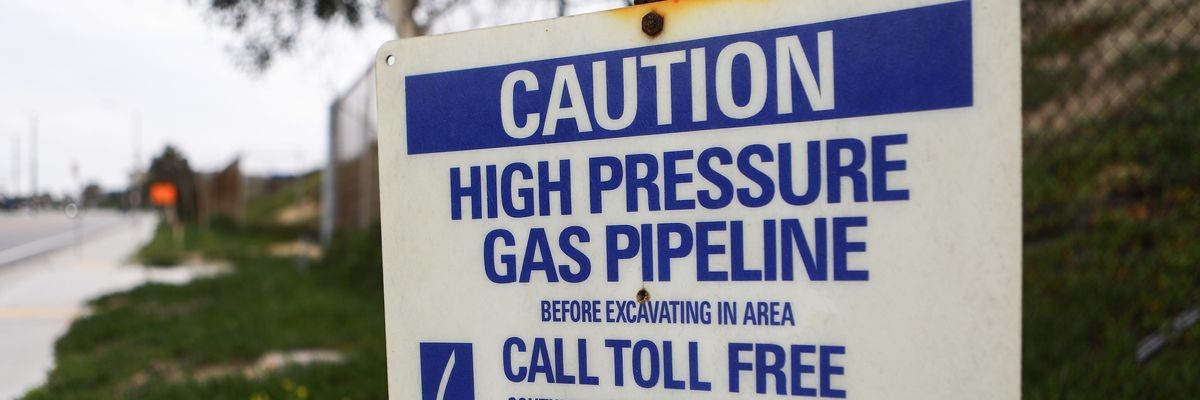Reps. Ilhan Omar and Chuy Garcia led a group of House Democrats on Tuesday in urging President Joe Biden to put a moratorium on federal permitting for new CO2 pipelines—infrastructure at the center of unproven carbon capture efforts—until robust safety regulations are finalized, warning that the current regulatory vacuum is a serious threat to public health.
"As an invisible and odorless asphyxiant, CO2 spewing from a ruptured pipeline can suffocate humans and animals without notice," Omar (D-Minn.), Garcia (D-Ill.), and 11 other lawmakers wrote in a letter to Biden. "Transporting CO2 under the extremely high pressure required to maintain a supercritical fluid state can cause ruptures that 'unzip' a pipeline over long distances, allowing CO2 to escapebefore the flow can be stopped."
The House Democrats called on the president to use his executive authority to place a moratorium on federal CO2 pipeline permits until the Pipeline and Hazardous Materials Safety Administration (PHMSA) completes work on safety regulations that the agency announced last year.
The lawmakers noted that "current regulations do not cover pipelines transporting CO2 as a gas or subcritical liquid, and are tailored to address the transport of hydrocarbon hazardous liquids, such as crude oil and refined petroleum products, which carry vastly different safety risks."
"New pipeline infrastructure will invariably put more communities in danger given the complexity of transporting CO2 thousands of miles."
There are currently around 5,000 miles of carbon dioxide pipelines in the U.S., according to the PHMSA, and analysts say that most of the existing pipelines are used for enhanced oil recovery—a process that involves pumping captured CO2 into oil wells in an effort to produce more oil.
But the Biden administration is pushing for an expansion of CO2 pipelines as part of what climate advocates say is a misguided and irresponsible buildout of carbon capture and storage infrastructure that's supported by the fossil fuel industry.
The bipartisan infrastructure law that Biden signed in 2021 boosts a tax credit that will incentivize the proliferation of CO2 pipelines, which have prompted major safety concerns and opposition from local communities. Jesse Jenkins, a professor of engineering at Princeton University, toldNPR that the U.S. could have more than 65,000 miles of CO2 pipelines within the next few decades.
The Democratic lawmakers point to NPR's reporting in their letter, writing that their concerns about the safety of the carbon dioxide infrastructure "are exemplified by the 2020 rupture of a pipeline, operated by Denbury Gulf Coast Pipelines, transporting CO2 in Satartia, Mississippi."
Earlier this year, NPRdocumented the harrowing experience of Satartia residents impacted by the rupture. One emergency worker said the terrifying scene "looked like you were going through the zombie apocalypse."
On Feb. 22, 2020, a clear Saturday after weeks of rain, Deemmeris Debra'e Burns, his brother and cousin decided to go fishing. They were headed home in a red Cadillac when they heard a boom and saw a big white cloud shooting into the evening sky.
Burns' first thought was a pipeline explosion. He didn't know what was filling the air, but he called his mom, Thelma Brown, to warn her to get inside. He told her he was coming.
Brown gathered her young grandchild and great-grandchildren she was watching, took them into her back bedroom, and got under the quilt with them. And waited...
Little did she know, her sons and nephew were just down the road in the Cadillac, unconscious, victims of a mass poisoning from a carbon dioxide pipeline rupture. As the carbon dioxide moved through the rural community, more than 200 people evacuated and at least 45 people were hospitalized. Cars stopped working, hobbling emergency response. People lay on the ground, shaking and unable to breathe.
The lawmakers warned that "new pipeline infrastructure will invariably put more communities in danger given the complexity of transporting CO2 thousands of miles with what could create dozens of points of entry and exit for CO2."
"Since PHMSA has authority over the safety of CO2 pipelines, states confront preemption issues, restricting their ability to protect residents from the dangers CO2 pipelines pose," the lawmakers wrote. "The absence of strong regulations leaves urban and frontline communities at greater risk, as carbon capture and storage, which depends on CO2 pipelines to function, rises in prominence."
The PHMSA is expected to release its updated regulations next year.
Jim Walsh, policy director of Food & Water Watch (FWW), applauded the lawmakers' call for a moratorium, saying that "communities across the country are opposing these carbon capture pipelines because they understand the risks they pose to their health and safety." FWW is one of the more than 150 environmental justice groups that demanded a moratorium in May.
"President Biden needs to use his authority to immediately enact a moratorium on permits for these dangerous projects," Walsh said Tuesday.

